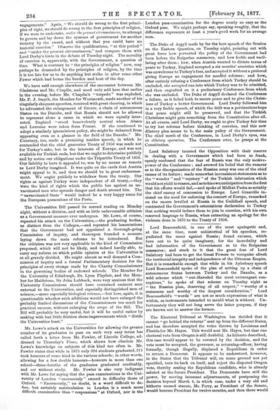The Universities Bill passed its second reading on Monday night,
without a division, and with as little unfavourable criticism as a Government measure ever undergoes. Mr. Lowe, of course, repeated his attack on the Universities,—the graduating bodies, as distinct from the Colleges,—and repeated his lamentations that the Government had not appointed a thorough-going Commission of inquiry, and thereupon founded a measure laying down the main reforms to be introduced. But the criticism was not very applicable to the kind of Commission proposed, which will not be likely, and indeed hardly able, to carry any reform on which public opinion at the Universities is at all gravely divided. He might almost as well demand a Com- mission of inquiry and a formal Parliamentary decision for the principles of every change made by the Charity Commissioners in the governing bodies of endowed schools. The Member for the University of Edinburgh, Dr. Lyon Playfair, and the Mem- ber for Maidstone, Sir John Lubbock, were very anxious that the University Commissions should have contained eminent men external to the Universities, and especially distinguished men of science,—more especially biological science,—but here, again, it is questionable whether such additions would not have enlarged the probably limited discussions of the Commissioners too much for practical success, without enlarging the scope of the Bill. The Bill will probably be very useful, but it will be useful rather by making with but little friction those improvements which" divide the Universities least."


































 Previous page
Previous page